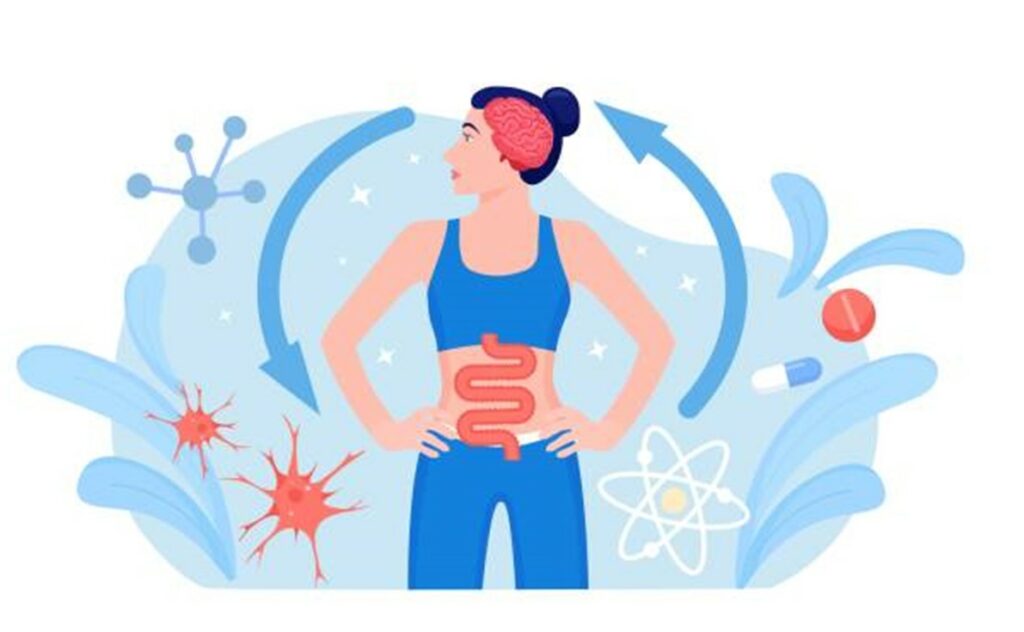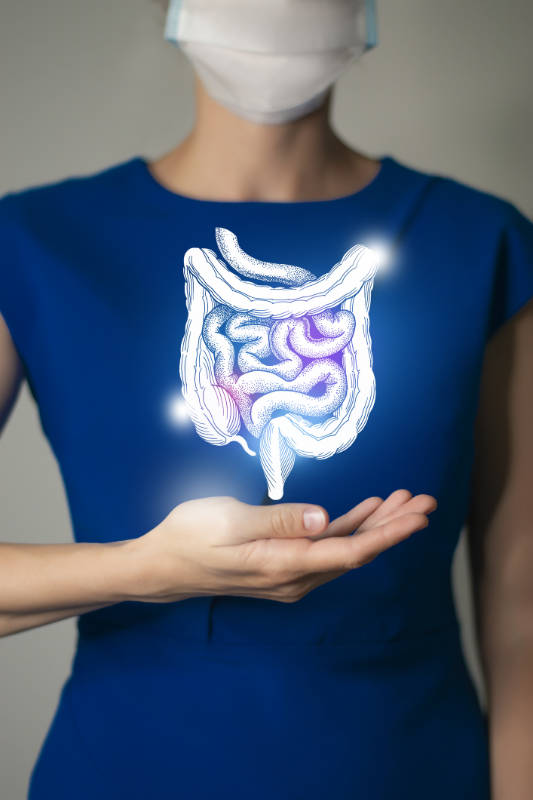A knot in your stomach, a lump in your tummy… All these expressions reflect a reality: we have always felt our emotions within our bodies. reality: we have always felt our emotions in our stomachs. Whether it’s stress, anger, anxiety or feelings of well-being and fulfilment, these feelings are the product of our brain and influence our intestine. But they can also originate in our digestive system, which sends feedback to our brain. Our emotions and these two “intestine-brain” organs have a strong and very unique connection, in which the intestinal flora plays a key role.
The intestine, our other brain…
The digestive system is far more complex than a simple food processing machine. Its capacities surpass those of all the other organs and even rival those of the brain. Since the intestine has its own nervous system, known in scientific literature as the enteric nervous system, medicine used to consider that the digestive system functioned independently of the brain. However, it is now clear that these two organs are closely linked and that an ‘intestine-brain axis’ exists. In reality, our digestive system is much more delicate, complex and powerful than we previously thought. According to recent studies, the interactions between the gut and the microbes it harbours can influence our emotions, our sensitivity to pain, our relationships with others and our decision-making, and this is not limited solely to our food choices or the amount of food we eat. The expression “thinking with your gut” takes on a neurobiological meaning that reveals the importance of the complex communication between the gut and the brain when making crucial decisions in our lives.


…and the key to managing stress?
Serotonin is a hormone well known for its essential activity on the nervous system. Rightly nicknamed the happiness hormone, it is also a signalling molecule that plays a crucial role in the brain-gut axis. Essential for the proper functioning of the digestive system – it is involved, for example, in the coordinated contractions that move food through the digestive tract – it is also involved in certain vital functions such as sleep, appetite, sensitivity to pain, mood and general well-being. Because of the extent of its involvement in the regulation of some of these brain systems, this signalling molecule is the main target of a class of antidepressants: selective serotonin reuptake inhibitors. Overall, the more serotonin we have available in our bodies, the better our mental health will be. The intestine is the body’s largest storehouse of serotonin. 95% of our body’s serotonin is stored there. Good intestinal health can therefore be crucial to good mental health.

The role of micro-organisms in the intestinal flora
Recent advances in communication between the gut and the brain have attracted the attention of researchers and the media in recent years. These surprising discoveries include the possibility of modifying the behaviour of a ‘shy’ mouse by transferring to it the intestinal flora of an ‘extroverted’ mouse. Similarly, transplanting the microbiota of an obese mouse with a voracious appetite can transform a lean mouse into a hyperphagic animal. In addition, eating probiotic-enriched yoghurt for four weeks can reduce negative emotional reactions in the brain in healthy women. These examples illustrate the ability of intestinal microbes to influence processes as complex as human behaviour, appetite and emotions. But how can these invisible creatures communicate with us ? How can we hear them ? Microbes are not only found inside the intestine. Many of them live in a thin layer of mucus and cells lining the inner wall of the intestine. In this unique environment, the microbes are in close proximity to the intestinal immune cells and the many cellular sensors that register our intestinal sensations. In other words, they are in close contact with our body’s most important information-gathering systems. This position allows them to pick up the emotional signals that the brain sends to the intestine, such as stress, joy, anxiety and anger, even if you are not fully aware of them. But they don’t just pick up these signals. Gut microbes are also capable of influencing our emotions by generating and modulating signals that the gut then sends to the brain. So what starts as an emotion in the brain has an effect on the gut and on the signals emitted by our gut microbes, which in turn are sent back to the brain, reinforcing or prolonging the emotional state we are in.

The mechanisms of action of psychobiotics.
Several mechanisms by which the microbiota affects the brain have already been identified. Two types of molecules are involved: those produced by the bacteria during their metabolic activity and released into the intestine, and those that make up the bacteria’s envelope, cilia or flagella (extensions with sensory or motor functions).
L’effet de ces molécules sur le cerveau peut être direct ou indirect. In the first case, they can pass into the bloodstream or activate nerve pathways in the intestinal mucosa. In the second case, these molecules can induce the release of certain compounds from the mucosa, which in turn circulate in the blood or activate the nerves. Intestinal bacteria produce various molecules in the intestine, which can be transported by the blood to the brain. However, an imbalance in the microbiota, caused for example by an infection or antibiotic treatment, can sometimes lead to excessive production of some of these compounds, which then become toxic to the body and may be responsible for brain disorders. A balanced intestinal flora, rich in probiotics, can therefore be essential for mental balance and for managing stress and anxiety. While much remains to be discovered about the precise causes of the influence these micro-organisms have on the way our brains work, their benefits are becoming better documented every day.








